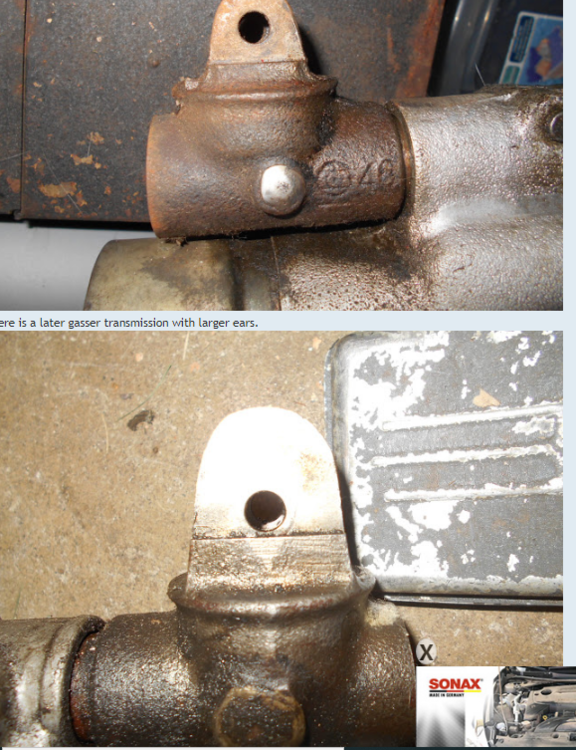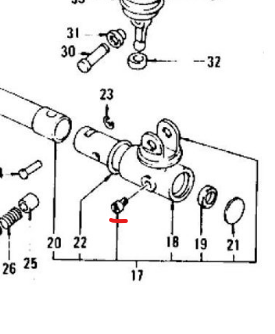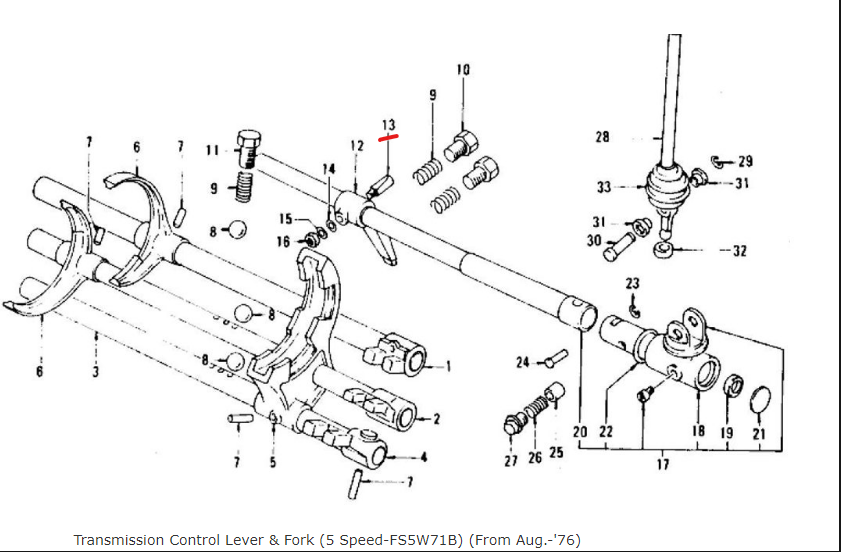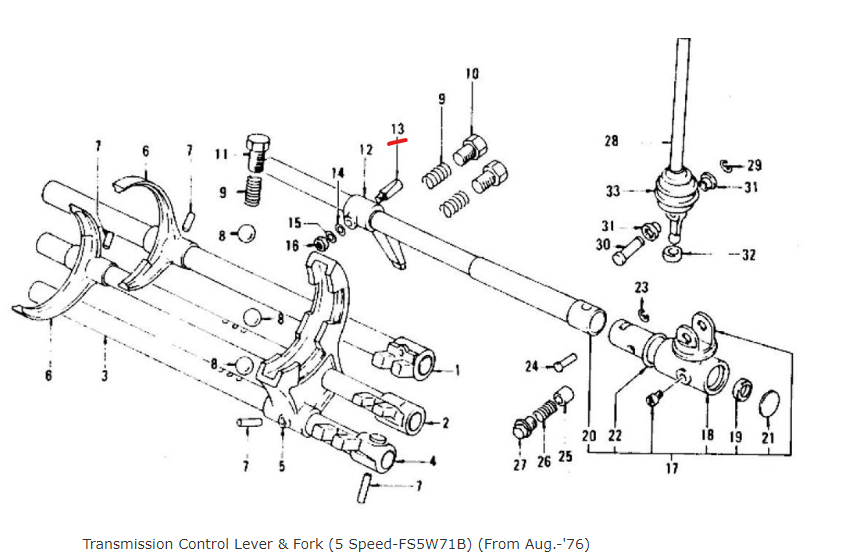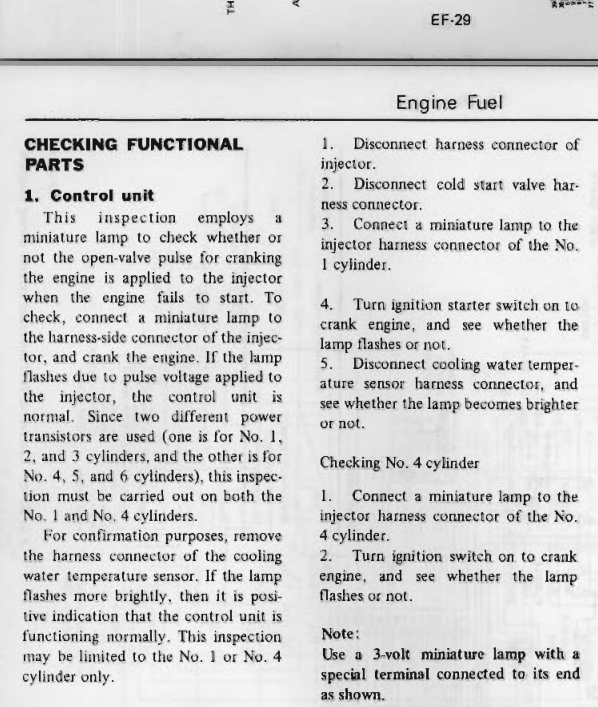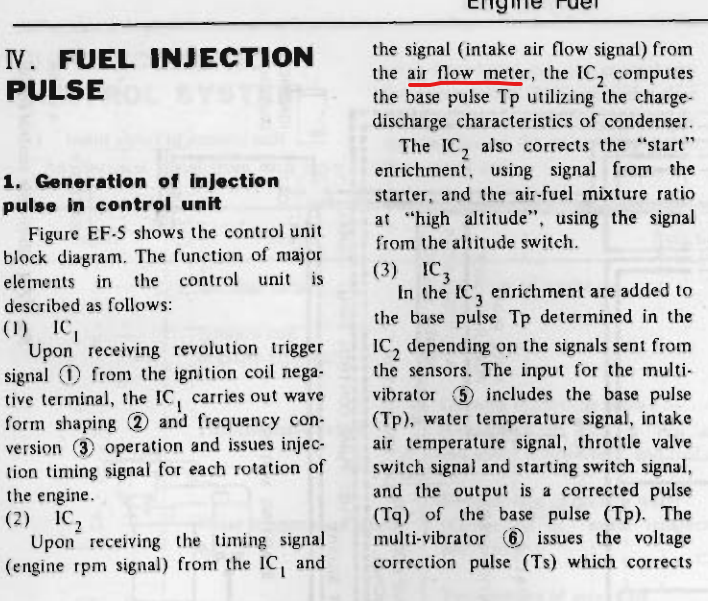Everything posted by Zed Head
-
What are the facts about 280z ECU compatibility and differences
The engine will run on three cylinders. Somebody actually cut one in half and ran it that way, if you recall way back. The Kent Moore Analyzer manual has more info that might help understanding. There might be a pdf file on the site but in the meantime there's this web site, broken down by single pages. - http://datsunforum.com/efi-troubleshooting-kent-moore-j25400-analyzer/
-
What are the facts about 280z ECU compatibility and differences
Some of the ECU's have all of the pins but many are not connected to anything. There's been a discussions about it. Chalked up to manufacturing "efficiencies" or overstock or things along those lines.
-
What are the facts about 280z ECU compatibility and differences
You might check the PCB circuits in the ECU that are connected to the sensors that control fuel enrichment. Coolant and air temperature sensors, for example. The AFM pins. If I had it sitting in front of me I might just check continuity from the PCB trace to the pin at the connector, for starters. Broken solder joints at the connector have been found and fixed, in past threads. If those are solid, then the components at the ends of the traces. Depends on how far you want to dig in to it. Could be fun. Finding that it starts lean. too lean to keep running, is a big clue.
-
Fuse ratings for fusible link replacements
Your work might save some future wiring harnesses if people follow it. If somebody had time, and a pile of fusible links, and a power source, they could probably define an approximate equivalent, fusible link to maxi-fuse. Just for fun. But if you don't need the excess amperage, it makes no sense to have a higher rating.
-
1978 5-speed transmission Tail-Housing Removal?
Are you going to take the shaft apart to get to oil seal #19? I got rid of my pile of 5 speed parts or I'd have done it already. Nobody has really dug in to that possibility as another source of the oil in the shifter cavity.
-
1978 5-speed transmission Tail-Housing Removal?
@zKars has the parts to be sacrificed, if he was interested. I think.
-
1978 5-speed transmission Tail-Housing Removal?
Looks like it might be a rivet. I'll bet you could grind the head off of it and the end would come off. Nissan never planned for this much disassembly, I'll bet, Might be some good stuff in the thread I found when I was looking for the picture. https://forums.nicoclub.com/transmission-stuck-in-first-gear-but-shifter-is-in-neutral-t602912.html
-
1978 5-speed transmission Tail-Housing Removal?
You're there...
-
1978 5-speed transmission Tail-Housing Removal?
-
1978 5-speed transmission Tail-Housing Removal?
Actually that's a good find. Maybe that's the one that leaks, not #22. It would be #19 in the parts manual. There's an o-ring, and an oil seal. It looks like the end of the striker rod should come off, exposing that oil seal. Maybe you can disassemble it without removing the rod. http://www.carpartsmanual.com/datsun/Z-1969-1978/power-train/transmission-control/5-speed
-
1978 5-speed transmission Tail-Housing Removal?
-
1978 5-speed transmission Tail-Housing Removal?
What's the number?
-
1978 5-speed transmission Tail-Housing Removal?
That is a good point. The only reason to remove the rod would be to replace the o-ring. Were it mine, I'd dribble some oil down the shaft and see if the o-ring leaks. If not, it doesn't need replacing. Welcome to the site ZBLUE1.
-
1978 5-speed transmission Tail-Housing Removal?
Is that some sort of orthogonal hammer driver?
-
1978 5-speed transmission Tail-Housing Removal?
Here's a drawing of the part. It's a wedge bolt like the kind that holds the pedals on to an upper-end bicycle. Wedging the part #12 against the case and twisting the rod might loosen the bolt. But, since it's a wedge shape, it will be wedged in there pretty tight. Wedges are powerful things.
-
What are the facts about 280z ECU compatibility and differences
Here's the FSM test procedure for 1978. It still uses engine cranking, but distributor spinning gives the same effect. I still think that there is another test procedure out there, maybe in the EFI Guide.
-
What are the facts about 280z ECU compatibility and differences
Breaking the Pin 1 circuit might work but the standard method is to make and break the coil circuit. Create a spark at the coil. Pin 1 needs to be connected to the circuit, of course, like it would be on the engine. Somewhere out there I think that there might be an actual Nissan write-up on it. Can't remember.
-
What are the facts about 280z ECU compatibility and differences
The three spark test supplies higher voltage to the EFI system than using the starter. Might be a clue. Plus it's quieter. Easier on the brain waves.
-
What are the facts about 280z ECU compatibility and differences
The FSM implies that the AFM signal is necessary but it must not need to be generated by the AFM. Since the engine will run with the AFM unplugged. The ECU just uses whatever is on those wires at the ECU connector. Open circuit seems to be enough.
-
What are the facts about 280z ECU compatibility and differences
You can get the ECU to open the injectors just by triggering three sparks, with the key on. If the circuit works. You could probably build a testing device with just power to the ECU, some lights on the injector grounding transistors and a voltage pulse to Pin 1. People often run their engines with the AFM unplugged. The base pulse is very basic, apparently it doesn't really need any sensor data. It's the starting point and all else is an addition to its length. Just saying, it's a simple input-output device. A scope would tell you base pulse length but might be more than needed to see if the ECU works or not.
-
What are the facts about 280z ECU compatibility and differences
It's just another reference point.
-
Crankcase to PCV Valve Hose
Can't that be measured? I wonder if a meter would show something. I had heard that the top hose was conductive, the black one. Might have got the PVC hoses mixed up. I didn't even know the silver color was a coating. I thought the material itself was silver. And that it was a silicone material. Maybe somebody painted a rubber hose silver on ea6's car and that's not even a Nissan hose. Anybody got a hose laying around and some solvent?
-
What are the facts about 280z ECU compatibility and differences
There's a reference to a Hybridz page in this thread that cygnusx1 supplied a while ago, that shows what some of the components do. Not in schematic form, but better than nothing. It's near the bottom of the Hybridz page. The link still works!
-
L28 full rebuild assembly
Nissan too, maybe. Your local Nissan dealer. http://www.carpartsmanual.com/datsun/Z-1969-1978/engine-280z/piston-crankshaft/21 https://www.courtesyparts.com/oem-parts/nissan-bolt-flywheel-1231542l11
-
Crankcase to PCV Valve Hose
I'd beat it on the garage floor, a rock, or a tree to break the stuff loose. Plug the ends if you don't want it to fly out.





